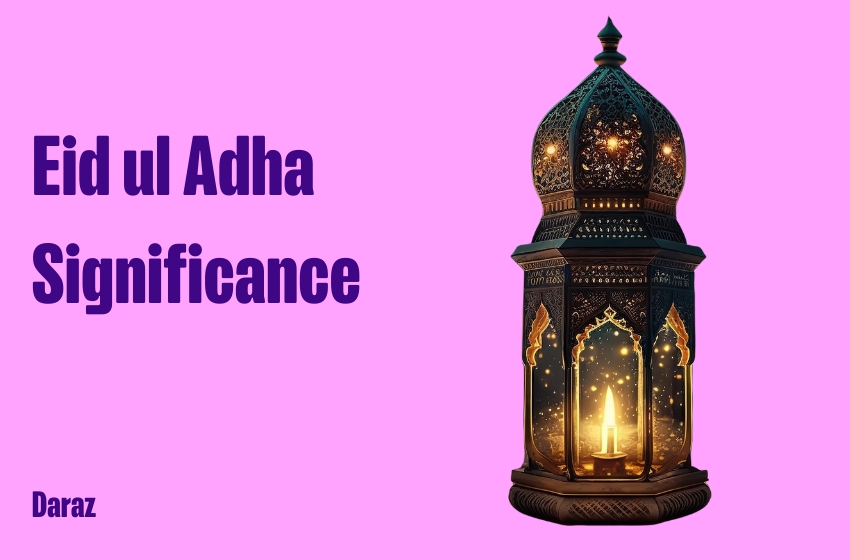
The Significance of Sacrifice in Eid ul Azha
Eid ul Azha, also known as the Festival of Sacrifice, holds great significance in the Islamic calendar. It is a time of deep devotion, reflection, and remembrance of the story of Prophet Ibrahim and his willingness to sacrifice his beloved son, Ismail as an act of obedience to Allah. In this blog, we will explore the rich symbolism and spiritual meaning behind the act of sacrifice in Eid ul Azha, shedding light on its importance and the lessons it imparts to Muslims worldwide.

The Story of Prophet Ibrahim
To understand the significance of sacrifice in Eid ul Azha, we must delve into the story of Prophet Ibrahim. As narrated in the Quran, Ibrahim received a divine command to sacrifice his son. His unwavering faith and submission to Allah’s will were put to the ultimate test. As Ibrahim prepared to sacrifice, Allah replaced Ismail with a ram (sheep), sparing the young boy’s life. This act demonstrated Ibrahim’s complete trust in Allah and serves as a profound example of devotion and submission.
Things we learn from Eid ul Azha
- Lessons of Obedience and Submission
Eid ul Azha serves as a reminder of the importance of obedience and submission to Allah. Prophet Ibrahim’s willingness to sacrifice his beloved son reflects his unwavering faith and devotion to Allah’s commands. Muslims worldwide emulate this obedience by offering animal sacrifices during Eid ul Azha. It symbolizes their willingness to submit to Allah’s will and demonstrate their devotion to Him.
- Sacrifice as a Test of Faith
The act of sacrifice in Eid ul Azha represents a test of faith. It requires Muslims to part with something of value to them, reflecting their willingness to prioritize their devotion to Allah above worldly possessions. It is a reminder that true faith requires sacrifice and the willingness to let go of attachments to material possessions for the sake of pleasing Allah.
- Sharing and Generosity
Another essential aspect of Eid ul Azha is the emphasis on sharing and generosity. After performing the sacrifice, Muslims distribute the meat among family, friends, and the less fortunate. This act of sharing highlights the importance of community, compassion, and helping those in need. It fosters a sense of unity and solidarity, reinforcing the values of generosity and selflessness.
- Reflection on Personal Sacrifices
Eid ul Azha also serves as a time for personal reflection. Muslims are encouraged to introspect and evaluate their own sacrifices in life, both big and small, and assess their commitment to living a life of righteousness and submission to Allah. It is an opportunity for self-improvement, repentance, and seeking forgiveness.
- Appreciation for Blessings
Sacrifice in Eid ul Azha instills a sense of gratitude for the blessings bestowed upon individuals and their families. By willingly parting with a portion of their wealth to perform the sacrifice, Muslims acknowledge the blessings and provisions they have received from Allah. It fosters a sense of humility and gratitude for all that has been provided.
- Unity and Brotherhood
Eid ul Azha promotes unity and brotherhood within the Muslim community. As Muslims across the globe participate in the act of sacrifice, it creates a sense of shared purpose and strengthens the bond between believers. The spirit of Eid ul Azha encourages Muslims to come together, celebrate, and support one another, irrespective of social, cultural, or economic differences.
- Environmental Consciousness
In addition to its spiritual significance, Eid ul Azha also promotes environmental consciousness. The act of sacrifice is accompanied by a responsibility to ensure animals’ ethical and sustainable treatment. Muslims are encouraged to prioritize the well-being and humane treatment of the animals they sacrifice, following the guidelines set forth by Islamic teachings. This includes providing adequate care, proper handling, and adhering to ethical slaughter practices. By practicing compassion and mindfulness towards animals, Eid fosters a sense of environmental stewardship and respect for all living beings.
- Remembrance of the Less Fortunate
Eid ul Azha serves as a reminder of the less fortunate members of society and the importance of empathy and support. Muslims are encouraged to share their blessings by distributing meat to those in need, ensuring that everyone can partake in the joy of the festivities. This practice reinforces the values of compassion, social responsibility, and the alleviation of poverty, fostering a sense of unity and collective responsibility toward the welfare of others.
Conclusion
Eid holds immense spiritual and symbolic significance for Muslims worldwide. The act of sacrifice reflects Prophet Ibrahim’s unwavering faith, obedience, and submission to Allah’s will. It serves as a reminder for Muslims to emulate these qualities in their own lives, to prioritize their devotion to Allah, and to foster a spirit of sharing, generosity, and unity within their communities. Eid is a time of reflection, gratitude, and renewal of faith, reminding individuals of the importance of sacrifice and the deeper meaning it holds in their spiritual journey.
Also, read Best BBQ Grill price in Pakistan, Best Mini Fridge in Pakistan, Best BBQ Party Ideas, EID-UL-ADHA BBQ RECIPES, Eid ul Adha 2023, Fridge Buying Guide
